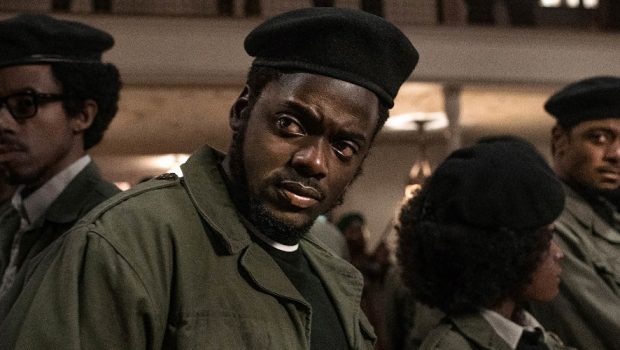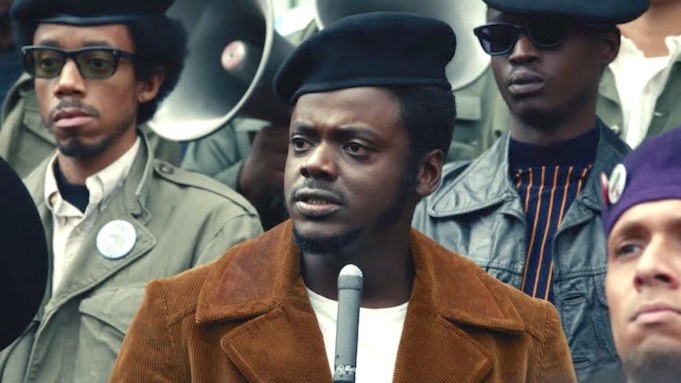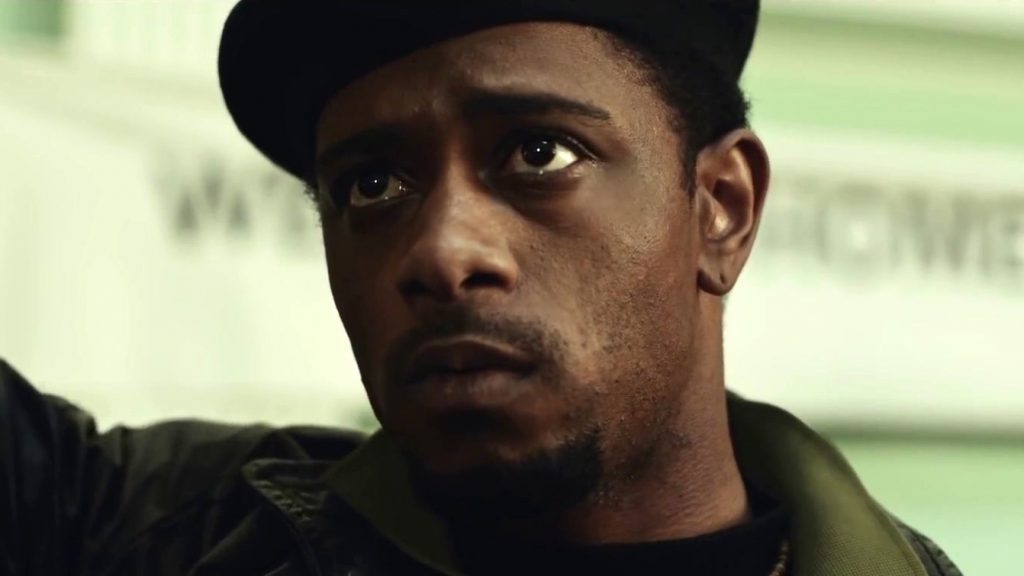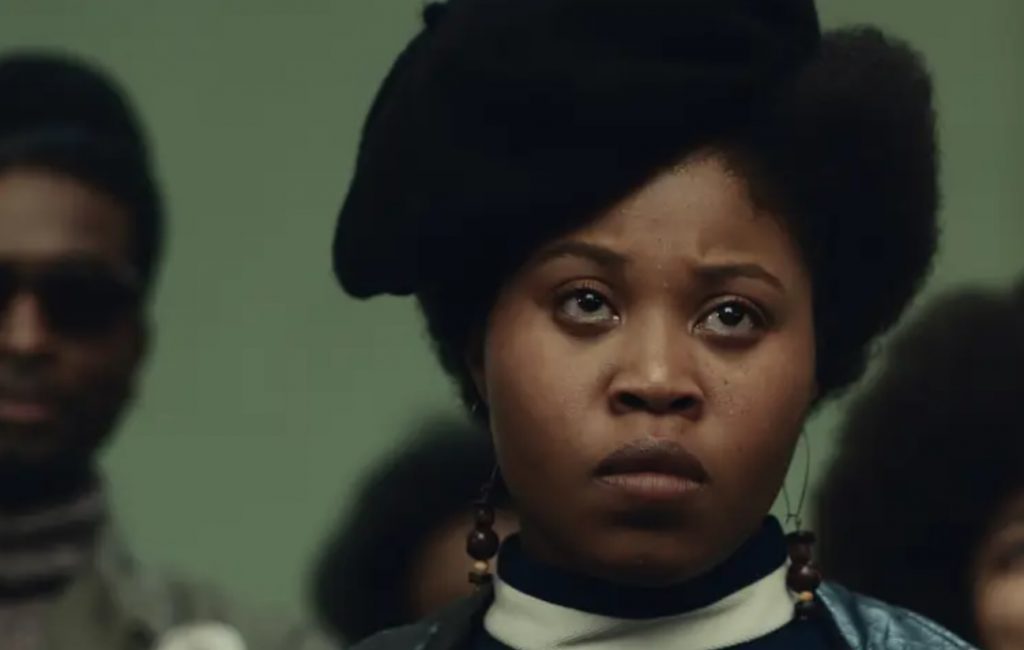Judas and the Black Messiah – Film Review
Reviewed by Damien Straker on the 8th of March 2021
Universal presents a film by Shaka King
Produced by Charles D. King, Ryan Coogler, and Shaka King
Screenplay by Will Berson and Shaka King
Starring LaKeith Stanfield, Daniel Kaluuya, Jesse Plemons, Dominique Fishback, and Martin Sheen
Music by Mark Isham and Craig Harris
Cinematography Sean Bobbitt
Edited by Kristan Sprague
Rating: MA15+
Running Time: 126 minutes
Release Date: the 11th of March 2021
Despite its imperfections, Judas and the Black Messiah resonates with anger and sadness. The execution of its dramatic convictions is second to its emotional current. However, it is still a powerful depiction of political injustice etched in meaningful contemporary allusions. The film dramatises how in the 1960s the FBI employed surveillance tactics to deliberately undermine the work of Black progressives fighting tirelessly for racial equality and human rights. It is well documented how the FBI discredited and sabotaged powerful historical figures of colour, including Dr. Martin Luther King, Jr. and Malcolm X. The organisation intended to preserve white empowerment and suppress meaningful cultural change that would galvanise the Black community.
Under the authoritarian hammer of its director, J. Edgar Hoover, the FBI probed the personal information of these Black leaders to discredit them and disassemble their political movements. Judas dramatises how the organisation dismantled the Illinois chapter of the Black Panther revolutionary group by murdering its passionate young leader, Fred Hampton. He was killed at twenty-one years old. The historical material is fascinating and rich enough to compile into a full-length miniseries rather than one two-hour film. Regardless, the story’s contemporary relevance is imbued by today’s rise of the Black Lives Matter movement. It is, like the Black Panther party before it, pressing for racial equality and social justice while being overly scrutinised and discredited by far right-wing conservative groups in America and white supremacy. Through this contemporary lens, Judas is at once frustrating in its execution, intense in modern applicability, and undeniably moving to behold.
The film adopts the perspective of a young thief named William ‘Bill’ O’Neal (Get Out’s LaKeith Stanfield). He is arrested after trying to steal a car by impersonating a police officer. He is told by an FBI agent, Roy Mitchell (Game Night’s Jesse Plemons), that he will assist the Feds or spend five years in gaol. Rather than being incarcerated, Bill undertakes a major assignment: infiltrate and spy upon the Black Panther Party in Chicago, including its leader, Fred Hampton (Daniel Kaluuya, Get Out and Widows). Bill’s anxiety is heightened by the revelation that there is another insider in the group who is responsible for torturing a member. Roy also finds himself pressured by Hoover (Martin Sheen in a small role) who wants fast results. He realises his own family might be at risk. Meanwhile, Fred enters a slow-burning romance with a Black Panther member, Deborah Johnson (Dominique Fishback). While it is a positive relationship, Deborah is increasingly concerned about Fred’s willingness to die for the cause. It undermines her desire to start a family with Fred after realising she is pregnant.
Judas is Shaka King’s first feature in nearly eight years, and he displays both his visual talent and rust. The film’s inciting incident is photographed with finesse. King employs an unbroken tracking shot to follow Bill as he enters a bar and impersonates a cop. By hiding behind his back, the camera choice signposts his trajectory throughout the story. He is concealing his identity and heritage from other people of colour. It is only when he is recognised as being too young to be a cop that we see his face. The rest of Judas employs suitably muted brown colours and intense close-up shots. Understandably, the close-ups evoke how each character, including Roy, are imprisoned by others. The most effective use of the tight framing is during Fred’s powerful speeches. They capture the passionate, fiery delivery in his eyes, the tepid reactions of a concerned Deborah, and Bill’s fearfulness. Visually, Judas would have benefitted from greater depth in its spatiality. Frequently using close-ups diminishes their power. Another technical issue is the sound mix. In an early speech, it is difficult to understand what Fred is saying. It could be attributable to poor sound mixing or the speed of the dialogue. Some refinement would have complemented an otherwise efficient recreation of this violent part of US history.
The film’s most impacting thematic goal is exploring how positive black communities are undermined by white law enforcement and self-interested people of colour. There is a powerful sequence where the police violently raid and destroy the Black Panther headquarters. Fred is already in prison. Yet once he is freed, he is stunned by the efforts of his people to rebuild the organisation. The moment typifies their sense of community and how they are portrayed as unifying different cultural groups. They manage to unify conservative whites, Hispanics, and their own people against police violence. There is also tension against other black political groups, such as the Crowns. This group is fictitious but underlines Fred’s need to form the Rainbow Coalition to unify the otherwise divided coloured activists. To further lessen the tension and the outcome of violence, Fred purposely disarms everyone in his car before entering a bar to recruit Black activists. Evidently, the Black Panther members are non-violent activists working to unify different people to enrich their cause.
Fred says at one point, ‘people decide to overthrow the government or not’, which infers grassroots action over senseless violence. Another example of a positive community is the gentle way Fred and Deborah grow closer and intend to start a family once she reveals she is pregnant. King deliberately infuses this plotline with dramatic irony. We know that Bill is being pressured by the FBI, but also being seduced by money, which will inevitably destroy Fred’s personal life. Bill is invited to Roy’s luxury home to share a drink and then dine in an upmarket restaurant. At one point, Roy assures him, ‘you will be properly compensated’. Bill continues to believe he will be enriched by betraying his own people, despite their intentions to bring equality to the Black community. The dramatic irony is further compounded by Roy’s misconception of the movement. He says to Bill, ‘you can’t cheat your way to equality’. The bitter dialogue reveals how misinformed white cops are regarding the movement.
The performances are another standout and heighten the film’s emotional involvement. LaKeith Stanfield effectively shows how crippling Bill’s psychological dilemma is as he tries breaking from the impossible bind. It is apparent how he starts to mentally deteriorate when tasked with murdering Fred. Though it is a touch questionable that everyone is indifferent to how distraught Bill is when the Panthers relax at home. Bill could have used more backstory to contextualise his need to be wealthy and sell out his people. Similarly, it is odd that he meets with Roy in a public restaurant in full view. Regardless, Daniel Kaluuya is also incredibly powerful as Fred. The force and the passion with which he speaks, audio issues aside, is undeniably strong. Arguably, Fred should have been the film’s protagonist with Bill relegated to the B-plot. It would have resolved the unease of Judas adopting a traitor as its protagonist to appear politically balanced rather than maximising its tragedy.
Furthermore, Kaluuya is a physically imposing person, which adds to Fred’s credibility as a leader capable of defending his people and negotiating peacefully. The only strange facet is that Kaluuya is thirty-two and looks much older than twenty‑one. Thankfully, his chemistry with Dominique Fishback is highly affecting. She is excellent as Deborah, the young woman concerned about Fred’s intense political commitments when they are planning to start a family. Her face is highly expressive of her anxiety during the speeches. It is also surprising how much she resembles the real Deborah. Meanwhile, Jesse Plemons and Martin Sheen are employed judiciously. There is a troubling, angry scene where Hoover says he knows everything about Roy’s family, including his children. As a question of his loyalty, Hoover asks Roy, ‘what are you going to do when your daughter brings a negro home?’ The moment burns because it reflects how character is pressured by vile authoritarians and fascism in America.
Judas and the Black Messiah is buoyed by telling an utterly riveting story. It is about how empowered black progressive movements are dismantled by the white American political system and how self-interest condemns people to their fates. There are flaws in the execution of the themes and some questionable stylistic choices. Certain aspects, such as the backstory of the characters, could have been expanded through a longer series. Nonetheless, the film’s historical content is strong, and the dramatic conviction of the excellent cast is paramount. Daniel Kaluuya, Dominique Fishback, and LaKeith Stanfield are mesmerising and affecting performers. The film is above all a chilling depiction of how the US government has for decades consolidated power at the top and used its strength and influence to crush grassroots efforts that challenge the status quo. Those who undermine the government’s authority are dehumanised and the people of colour who remain compliant are destined to fall under the heel of the same archaic political systems that marginalise them. The way the film touches on this troubling, perpetual social dilemma is at times clumsy but undeniably moving.
Summary: Despite its imperfections, Judas and the Black Messiah resonates with anger and sadness.










